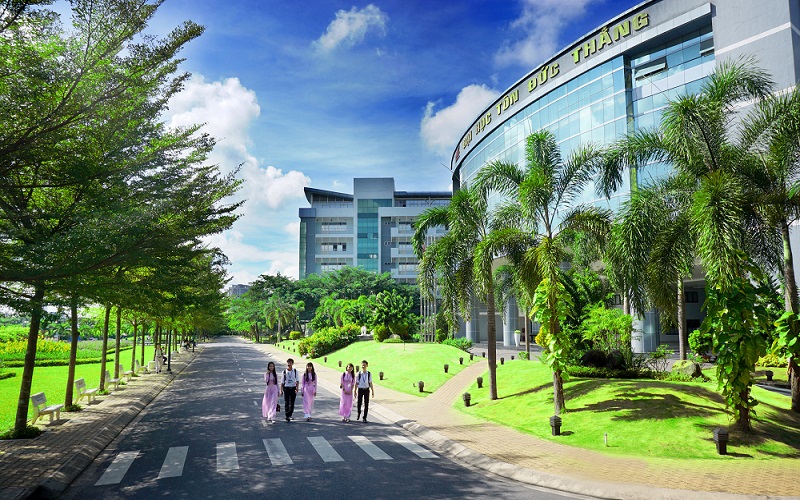1. Training objectives
1.1 Overall objective
- Training people to develop in all aspects: highly professional, ethical, good political sense.
- Training and nurturing theoretical and professional abilities; Contribute to the supply of human resources for the industrialization and modernization of the country.
- To serve the needs of learning, raising the level of people of all strata.
1.2 Specific Objectives:
- Knowledge:
+ Knowledge of general education: students are equipped with knowledge of general education on political theory, law, basic math, foreign language and skills support, physical education and national defense education .
+ Basic knowledge of the discipline: students are equipped with specialized knowledge in mathematics, programming methods, principles of organization and operation of computer systems, applications of information technology.
+ Specialized knowledge: students are equipped with basic and advanced knowledge in the field of computer science. Depending on the knowledge block selected for specialized subjects, students are equipped with knowledge related to the development and application of information systems for enterprises; knowledge of design, construction, installation, operation and maintenance of software; knowledge of computer networks and communication, information security and confidentiality; Research and develop intelligent and effective software solutions through the use of intelligent calculation methods and artificial intelligence etc.
- Skills:
+ Bachelor of Computer Science is able to detect and solve problems in the field of Computer Science. Specifically:
o Knowledge of algorithms and calculation methods to build IT applications to meet the real-life needs of society. Students have good programming skills, and they can join the research and development of professional software market; Ability to analyze, design and develop enterprise information systems.
o Apply modern algorithms and mathematical models to solve practical problems. Ability to research and develop intelligent software systems based on intelligent calculation methods and artificial intelligence.
+ Students after graduation will meet the requirements of the employer. Students have the ability to orient, plan well in career development, adaptability and high self-training to meet the new requirements well.
+ Excellent students can participate in scientific research, self-improvement to continue to study at higher levels and contribute to the same field.
+ Students are trained to improve their English skills to be able to update themselves, be comfortable and competitive in the global IT environment.
+ Students have a professional working style equipping with:
o The specialized knowledge of computer science.
o Practical work experience in software projects.
o Operational procedures inside a software company through corporate analytics.
o Support skills (university methodology, teamwork skills, writing and presentation skills, etc.).
- Attitude:
+ Students are aware of the need to constantly improve their education, professional skills and ability to learn foreign languages for lifelong learning.
+ Students have good moral qualities, high discipline, scientifically behaved, serious, professional ethics and passion for science.
+ Student awareness of contemporary issues and the role of the technical solutions in the context of economic, environmental, global society and in the context of the country.
- Foreign language proficiency: IELTS 5.0 or international certificates recognized by Ton Duc Thang University.
2. Time period of training: 4 years
3. Block the amount of knowledge the whole course: 136 TC
(in units of credit and not including Physical and National Defense Education)
4. Subjects of enrollment: According to the regular college enrollment regulations of Ton Duc Thang University.
5. The training process, graduation conditions
Apply according to the regulation on organization and management of bachalor level 1174/2017 /QĐ-TĐT issued on July 11th, 2017 by Ton Duc Thang University.
6. Scoring : 10/10
7. Curriculum content: Total cumulative credits : 136 (credits)
A. General education background: (44 credits)
A.1. Political Theory (10 credits)
A.2. Social Studies (2 credits)
A.3. Natural Sciences (12 credits)
A.4. Foreign Language (15 credits)
A.5. Supporting Skills (5 credits)
A.6. Physical education (certificate)
A.7. National defense education (certificate)
B. Knowledge of teaching vocational education: (92 credits)
B.1. Basic knowledge: (12 credits)
B.2. Industry knowledge: (80 credits)
B.2.1. General knowledge: (13 credits)
B.2.2. Specialized knowledge: (67 credits)
- Required: (28 credits)
- Optional: (39 credits)
Credits vary with the updated curriculum framework, item number 8.
8. Curriculum Framework and Training Plan (attached)
9. Program implementation
9.1. Training Plan:
- The Computer Science curriculum is administered in 8 semesters with the total cumulative credits required for each student to graduate to qualify for graduate study of 136 credits.
- The training sequence is described as the attached training plan.
- There will be two graduation rounds each year. Students who qualify for the graduation thesis can apply for the thesis. The duration of the thesis is 6 months, excluding the time for the activities of reviewing, editing and protecting the council before the session.
9.2. Conditions to ensure the training
- Facilities: The training is held at the head office of the school with facilities that meet modern teaching methods.
- Teaching staff: Lecturers have master's degree or higher, skilled and high.
- Curriculum: The curriculum is designed by the Faculty Council and approved by the Principal. The program is changed only after the recommendation of the Faculty Council and approved by the President.
9.3. Training methods
- The training program in the form of concentration.
- Credit management training.
- Active teaching methods, learner-centered.
9.4. Program evaluation
- The program is designed in a monophyletic fashion.
- The program is evaluated according to the process of evaluating the training programs of the University, feedback from employers, alumni, opinions of experts and testing organizations in the world.

